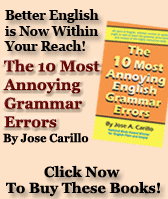- HOME
- ENGLISH FORUM
- BADLY WRITTEN, BADLY SPOKEN
- GETTING
TO KNOW ENGLISH - POUR OUT YOUR MIND IN ENGLISH
- GOING DEEPER INTO ENGLISH
- YOU ASKED ME THIS QUESTION
- EDUCATION AND TEACHING FORUM
- ADVICE AND DISSENT
- MY MEDIA ENGLISH WATCH
- NOTABLE WORKS BY OUR VERY OWN
- ESSAYS BY JOSE CARILLO
- ABOUT JOSE CARILLO
- TIME OUT FROM ENGLISH GRAMMAR
- NEWS AND COMMENTARY
- BOOKSHOP
- ARCHIVES
NEWS AND COMMENTARY
| WORLD NEWS | COUNTRY NEWS |
COMMENTARY | MEDIA RELEASES |
Philippines:
Good English not everything
By Efren L. Danao, The Manila Times
GUANGZHOU, China—On my two-hour trip from this city to Zhuhai, I read a lot of instructions in English that made me smile. However, when I learned that Zhuhai, now a progressive city, was just a small fishing village barely 29 years ago, I suddenly felt like crying.
One of the first signs that caught my eye when I landed at the Baiyun domestic airport of this city from Shanghai was the one that said: Flight Irregularity Service. When I inquired why somebody would provide service for flight irregularity, I learned that that was not really what was meant. The booth provides service for those whose flights were either cancelled or delayed and they needed to get another flight or hotel reservations.
And how about the road sign that said: “Do not drive tiredly” Or this one: “Take right lane to run.” Then, there is the sign warning against “Rear-end collision.” A collision is always head-on but rear end? Only in China.
United Kingdom:
Prune That Prose: Learning to write for readers beyond academe
By Gail A. Hornstein, The Chronicle Review
Do you ever read your prose aloud, either quietly to yourself or at a public reading of your work? Too many academics would answer no to that question. We have a kind of reverse aestheticism—if our writing is dense and unwieldy, filled with technical terms and convoluted sentences, we wear its lack of accessibility as a badge of honor.
A friend in mainstream trade publishing, who'd like nothing better than to buy books written by smart people on important topics, cringes when she spies an academic heading toward her at a party. For D and her editorial colleagues, "academic" is shorthand for "lifeless prose, cumbersome to read, filled with unnecessary complication, often disdainful and stridently obscure in style and tone." If by chance they do wind up wanting to acquire a manuscript by a faculty member, the first thing they say at the editorial meeting is: "But he doesn't write like an academic!"
Foenetic spelers v. Shakespeare: the literacy battle
By Will Munsil
This column begins with a great headline. “Edward Rondthaler, Foenetic Speler, Dies at 104,” read The New York Times’ obituary section last week.
Rondthaler lived a uniquely American life. He was, at various points, a choir student, a psychology major, a trendsetting typographer and a passionate advocate for spelling reform. He claimed the difficulty of English spelling was the root cause of many social ills, from “jooveniel delinquency” to “criem-in-th-streets,” as he delightfully wrote in the Times in 1977.
Though Rondthaler’s quixotic passion has yet to change our spelling, he nevertheless managed to strike at an important truth, one that is gaining relevance in this technological world: The English language is difficult to master, and we’re not learning it like we once did.
The literacy statistics are arresting. A 2005 study by the National Center for Education Statistics claimed that only 31 percent of recent college graduates could be termed “proficient” in reading and understanding prose, down 10 percent from 1992. More anecdotally, a general sense of decline has clearly crept into our beliefs about our literacy.
But some say that this view is wrong.
What is needed for better English grammar and composition in school?
By Jean Purcell, Examiner
I have taught and tutored students in English grammar and composition. I have worked with high school students aiming for top colleges and universities. The goal has been to improve their English composition grades during sophomore and junior years of high school. The students were privileged to attend outstanding private schools.
Why then, would those students need a tutor in English composition before applying for well known universities and limited scholarships? Why had the students not learned the basics of organization, premise or thesis sentences, examples and message points, and conclusions that work together to form comprehensive opinions, facts, or observations? Why had gifted students not yet learned to write well?
Why did they not know the importance of simple sentences and paragraphs with 14-21 words and three to five sentences, respectively? Why had they not learned why pithy writing can be as good as lengthy descriptions, explanations, or summaries? Every gap reflected poorly on their English composition instructors.







